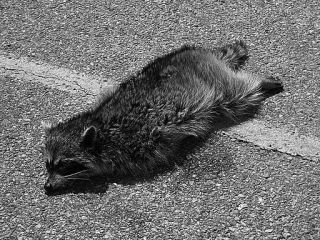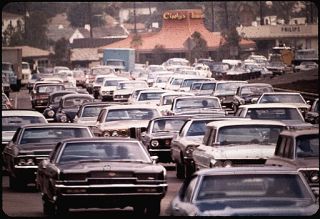Animal Behavior
Habitat Fragmentation Is Turning Commuters Into Roadkill
Both humans and animals are dying to cross the road.
Posted February 13, 2024 Reviewed by Michelle Quirk
Key points
- Animals must cross dangerous human roads to get to vital resources.
- Habitat fragmentation is a key cause of animal fatalities.
- Humans often become casualties of their own inventions (like roads and motor vehicles).
I was driving to work yesterday, and a squirrel darted in front of my car. He nearly lost his life. He does it several times a day. Every day. One of these days he won’t make it to the other side. Why doesn’t he learn? Why doesn’t he stay on one side?
Then it dawned on me. I am just like that squirrel. I nearly lose my life every day. Yet I continue to commute 55 miles each way, every day. One of these days, I won’t make it. Why don’t I learn?

The Question
This post is about one thing—crossing the road. What is so important on the other side? If we can figure that out, maybe we will find an answer common to all species.
My guess is this: If that squirrel is anything like me, it loves its home and doesn’t want to give it up. But it also loves what’s on the other side (just like I do) and doesn’t want to give that up either. I love teaching at my university. It’s another kind of home that’s hard to live without. In psychology, we sometimes refer to this feeling as heimvalenz (the value of home). Every living thing has something it doesn’t want to give up.
So let’s ask the question again: Why don’t squirrels (or commuters for that matter) ever adapt? Maybe it’s because there is something precious on *both* sides of this habitat—but a river of asphalt runs through it.
The Habitat Problem
This question may seem hard to answer, but we scientists already know the root cause of this particular problem. We call it habitat fragmentation. Habitat fragmentation is the act of splitting a once unbroken world into smaller pieces—pieces that are too small to support the needs of the animals who live there. Roads and political boundaries are two ways that our species fragments this living habitat we all call home.
Roads are like lifeless rivers of rock where nothing grows. Animals don’t know what to make of them. Animals don’t see roads the way we do, or whisper to one another, “Oh good! Someone is building a road through our land!” No. Animals don't know what cars are. They see our roads full of roaring cars as raging rivers of iron cattle—emotionless beasts that trample anything that gets in their way. There is no safe time to cross them, day or night. Roads are, at best, terrifying nuisances to animals. Meanwhile, we view roads as wondrous human works (which they are)—and see animals as nuisances that need to get out of our way. Something seems wrong with this mindset and our view of the meaning of life.
The Unwarranted War Against Nature
There is a sort of endless war on this planet. That war is between living things and man-made things (Halton, 2023; O’Grady and Meinecke, 2020). Our egocentric, faster-than-life philosophy is at odds with the slow and humble purpose of every other species. Habitat fragmentation is negatively impacting both nonhuman animals seeking resources and human beings seeking work. Home is on this side of the river and our needs are on the other. This struggle between urban sprawl and simple existence is taking its toll on all of us, as animals try to avoid our roadways and humans try to survive their use.
The Tragedy of a Fragmented Home
Every living thing needs a home. Every creature needs a place to live and a habitat big enough to supply its needs (Elton, 1927). Unfortunately, the human animal has fragmented the homeland of all living things, divvying up the Earth like an inheritance meant for only one of its many offspring. Perhaps worse than that, the things we need are now separate from the things that need them. Here are just a few of the problems brought about by the deliberate fragmentation of a once-continuous habitat:
Impact on Wildlife
- Resource access: Habitat fragmentation makes it challenging for wildlife to access critical resources like food, water, and shelter, leading to reduced survival rates and population declines.
- Genetic diversity: Isolated habitats limit gene flow among populations, increasing the risk of inbreeding and reducing genetic diversity, weakening resilience to environmental changes.
- Predation risk: Smaller habitats expose wildlife to higher predation risks, contributing to population declines and localized extinctions.
- Migration barriers: Fragmentation disrupts migration routes and breeding grounds for migratory species, leading to fatalities when animals attempt to cross barriers like roads and urban development.
- Loss of biodiversity: Habitat fragmentation results in the loss of plant and animal species, altering ecosystem composition and reducing biodiversity.
Impact on Human Commuters
- Long commutes: Residential areas being separated from commercial zones necessitate long commutes for human access to essential resources, impacting quality of life and consuming time and resources.
- Environmental impact: Long commutes contribute to environmental issues such as traffic congestion, emissions, and air pollution, leading to health problems and economic costs.
- Stress and mental health: Extended commutes increase stress levels and anxiety, affecting mental well-being, job satisfaction, and work-life balance.
- Economic costs: Long commutes incur financial expenses related to fuel, vehicle maintenance, and public transportation fares, straining household budgets.
- Time constraints: Lengthy commutes limit time for leisure and personal pursuits, affecting social relationships and overall quality of life.

Final Thoughts
I will drive to work tomorrow like I usually do. A squirrel will probably try to run in front of me and make me feel awful for running over him. And one day, I won’t make it to work and someone might feel badly for me as well. But this is not new. Long ago, the Scottish poet Robert Burns (1785) had an experience similar to mine. While trying to plow a field on his family’s estate, he realized he was accidentally ruining the meager habitat of a mouse, and wrote about it with much regret:
I’m truly sorry Man’s dominion has broken Nature’s social union, an’ justifies that ill opinion, which makes thee startle, at me . . . still, thou art blest, compar’d wi’ me! The present only toucheth thee . . .
He knew that winter was setting in and knew that tiny creature had nowhere to hide from the cold. He also knew his own family might not survive there, either, in a land where the current inhabitants had somehow forged a silent agreement with survival eons ago. He knew that mice do not think about all the yesterdays they regret as men do, nor miss all the tomorrows they will never see.
Sometimes I think about all we have lost as I drive so far away to be with what I wish were so much nearer. Sometimes I wonder if Something wiser than me is looking down on me like that squirrel, and wondering why I do what I do.
References
Burns, R. (1785). To a mouse. Poetry Foundation.
Elton C. S. (1927). Animal Ecology. Chicago: IL: University of Chicago Press.
Halton, E. (2023). A brief biography of Lewis Mumford. University of Notre Dame.
Markey, M. A. & Meinecke, L. M. (2020). Examining Biophilia and Societal Indifference to Environmental Protection. Hershey, PA: IGI Global Publishing. doi:10.4018/978-1-7998-4408-2




